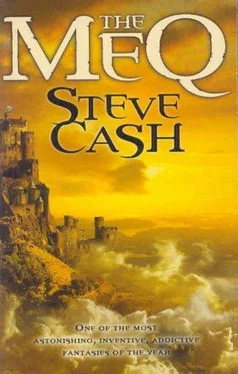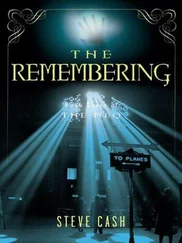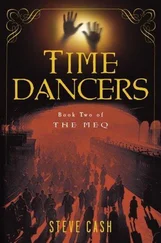Steve Cash - The Meq
Здесь есть возможность читать онлайн «Steve Cash - The Meq» весь текст электронной книги совершенно бесплатно (целиком полную версию без сокращений). В некоторых случаях можно слушать аудио, скачать через торрент в формате fb2 и присутствует краткое содержание. Год выпуска: 2005, Издательство: Del Rey, Жанр: Фэнтези, Детективная фантастика, ya, на английском языке. Описание произведения, (предисловие) а так же отзывы посетителей доступны на портале библиотеки ЛибКат.
- Название:The Meq
- Автор:
- Издательство:Del Rey
- Жанр:
- Год:2005
- ISBN:нет данных
- Рейтинг книги:4 / 5. Голосов: 1
-
Избранное:Добавить в избранное
- Отзывы:
-
Ваша оценка:
- 80
- 1
- 2
- 3
- 4
- 5
The Meq: краткое содержание, описание и аннотация
Предлагаем к чтению аннотацию, описание, краткое содержание или предисловие (зависит от того, что написал сам автор книги «The Meq»). Если вы не нашли необходимую информацию о книге — напишите в комментариях, мы постараемся отыскать её.
The Meq — читать онлайн бесплатно полную книгу (весь текст) целиком
Ниже представлен текст книги, разбитый по страницам. Система сохранения места последней прочитанной страницы, позволяет с удобством читать онлайн бесплатно книгу «The Meq», без необходимости каждый раз заново искать на чём Вы остановились. Поставьте закладку, и сможете в любой момент перейти на страницу, на которой закончили чтение.
Интервал:
Закладка:
We looked for Sailor and would never have seen him, even though he stood just fifty yards away, except he was the only thing not moving. He was standing next to a rickshaw and staring at us. He wore a bright red and gold robe with wheels or circles embroidered around the edge and a round straw hat with a flat top and a drawstring pulled tight under his chin. He looked like a circus puppet. I glanced at Geaxi and she didn’t seem to think it odd in any way.
We made our way over to Sailor, dodging through the maze of people and goods, and without a greeting except to look in our eyes, he said, “This way.” A man with the thinnest shoulders I’d ever seen loaded our luggage on the back of the rickshaw and then pulled the three of us to a section of Shanghai known as the Chinese City, the oldest part. We were almost twenty-five days overdue and I wondered if Sailor knew about Baju and what had happened.
We stopped in front of a shop crowded next to a hundred others on a street crowded next to another street just like it. There were a thousand sounds and smells, a few of which made you want to know the source, but most of which didn’t. It was a shop that sold nothing but funeral trappings. And far from being grim and somber, it was bright with color everywhere. Crimson satin coverings for coffins hung aloft and around on the shelves or under glass cases there was apparel for the dead; richly embroidered robes, slippers, and headgear. There were priests’ robes and white cotton raiment for the mourners. Somewhere in the shop there was everything for a proper and glorious Chinese funeral.
Sailor led us quickly to the back of the shop and through a door to the private living quarters. It was cramped but fairly clean, with a single window that opened onto a narrow alley and very little light. He took off his straw hat, laying it carefully on a nightstand, and without being asked, gave me answers to the questions I had been pondering.
“There was a cable waiting for me when I arrived,” he said, “from Owen Bramley. It was good that I had not let Kepa’s son, Gotzon, sail with me.”
“Were you assaulted?” Geaxi asked.
“No,” he said and looked at her strangely. “I was thinking of Gotzon and how he would have felt if he had heard the news of his brothers here, so far from home. It has been a long time since I have lost someone as close as Baju. I know Gotzon would have felt helpless, as I have.” He fell silent and stared at the sapphire on his finger, rubbing it with his thumb and turning it around and around. Then he looked up at Geaxi. “Did they get the Stones?”
Geaxi glanced at me before she answered. “Yes and no,” she said.
Sailor looked puzzled. “I do not understand,” he said and looked over at me.
Geaxi told him the whole story, leaving nothing out except the few moments we were in the Bitxileiho, for which Sailor needed no explanation. She slowed down when she told him about me and the Stone with no gems and the man with thin eyes dropping the pistol. Sailor did not react and she went on until she got to the part about Baju. She took her beret off and clenched it in her hands. She started to speak again and then stopped, looking away from both of us toward the single, airless window.
I let a moment pass and then told Sailor what Baju had whispered to me as he was dying. Sailor’s puzzled expression returned, but he said nothing. He walked the few steps over to Geaxi and took her hand in his. Then he spoke to me.
“I have often suspected this about the Stones,” he said. “Your father and Baju and I used to discuss it, but we would never have defiled a sacred trust merely to satisfy our curiosity. It is ironic, no? That we have solved this mystery in such a horrid manner and for such an empty purpose.”
I watched him. I watched him look inside himself and I could almost see him sitting with Baju and my papa and others on a cliff somewhere in a remote part of the world, talking of the mysteries of Life, and the Stones, and of being Meq. I could see them all sitting there, knowing so much, sharing so much, and being careful with each other and the Truth. Now, another one from that circle, another friend, was gone.
“Tomorrow we begin our search,” he said. “This news, more than any other, tells us who we seek first. We must find Zeru-Meq. It will be difficult, yes. He is unpredictable, completely unpredictable, but I know he is in China.”
“That’s what Geaxi said about the Fleur-du-Mal,” I said.
“It is true. That is where he learned his unpredictability, from his rather unusual uncle. Fortunately, his uncle is not ‘aberrant.’ There is a difference. If the Fleur-du-Mal is responsible for Baju’s death, he will tell Zeru-Meq about it. He will be compelled to do so.”
“How do you know?”
“You will have to ask Zeru-Meq the source of that. It has always been so. When the Fleur-du-Mal has acted ‘badly’ and is proud of himself, he always finds his uncle to boast and brag of it. It is a mystery.”
“What about Opari?”
“We have exhausted every lead, rumor, and trace of her in Asia. If she is still in China, Zeru-Meq is the only one who will know it. There is a problem, however.”
“What is that?”
“Zeru-Meq is nearly as difficult to find as Opari herself.”
I looked at Geaxi. She was not despondent, but as close to it as she had ever been. Sailor let go of her hand and sat down on a bed that was really no more than a bench. As he did, the sash holding the red and gold robe came undone and the robe opened. Underneath, he was wearing a cotton shirt, trousers, and his leather boots laced to the knees. I said, “What are you supposed to be in that robe and that straw hat?”
“The same thing you will be starting tomorrow. A Tibetan Buddhist monk. It is not unusual for their monks to be children. We will say, if we are asked, that we are from some obscure sect, which could also explain our Western features, and we are traveling together on a sacred pilgrimage.
“We are on our own now, as it should be. We must use our wits, skills, and powers in a controlled and muted fashion. I will cable Unai and Usoa tomorrow before we leave and tell them who we seek and why. They will need this news of the Stones. I will tell them to watch for any appearance of the gems in the purlieu and underground world of the Fleur-du-Mal. We will find Opari and then turn our attention to the Fleur-du-Mal.” He paused a moment, looking back and forth between Geaxi and me. “Do you both agree?”
We agreed and told him so, but inside I wished the order of our search could be reversed.
The next day, our journey began. It was the fall of 1896. Sailor had secured passage with an old Chinese man from the south, Ling Kai, and his even older Chinese junk to take us up the Yangtze River as far as we needed to go. Ling Kai considered it an honor, saying he had long been a devout Buddhist and mystic himself. He also smoked three bowls of opium a day.
Our long Buddhist robes were uncomfortable at first and we now looked like three puppets instead of one, but in time we all adapted to wearing them. And they served us well. Before we had gone a hundred miles upriver, we were stopped or boarded four times by Chinese and British officials. I wondered if this was the way it was going to be, but within another hundred miles, we were just another vessel sailing upstream and back in time on a river that was once known as the “River at the Center of the World.” And I believed it when Geaxi translated a poem for me. It was carved into a five-foot stone pillar that served as a bollard for securing boats on one of the little docks in one of the endless villages along the Yangtze. It seemed to be centuries old and I asked Geaxi if the author had signed it. She said no. The inscription read, “Upriver, downriver — it is nothing to disappear in China.”
Читать дальшеИнтервал:
Закладка:
Похожие книги на «The Meq»
Представляем Вашему вниманию похожие книги на «The Meq» списком для выбора. Мы отобрали схожую по названию и смыслу литературу в надежде предоставить читателям больше вариантов отыскать новые, интересные, ещё непрочитанные произведения.
Обсуждение, отзывы о книге «The Meq» и просто собственные мнения читателей. Оставьте ваши комментарии, напишите, что Вы думаете о произведении, его смысле или главных героях. Укажите что конкретно понравилось, а что нет, и почему Вы так считаете.












